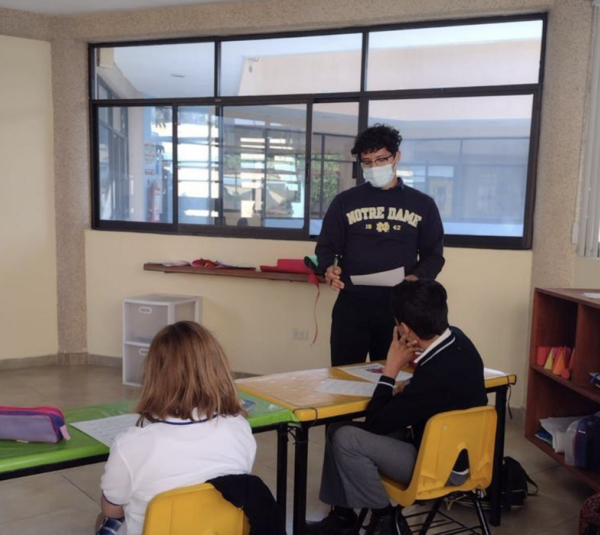Puebla student reflection: The children of Artur Martorell

Drew Morgan is junior at the University of Notre Dame, studying English and Spanish, as well as a minoring in TESOL (Teaching English to Speakers of Other Languages). During his semester abroad in Puebla, Mexico, he had the opportunity to volunteer at a local elementary school. He worked in a classroom with a group of 6th graders, aiding the teacher in the lessons, and even getting to teach some of the lessons on his own. He writes about the experience and how languages are a way to connect with the world.
Cultural exchanges can be both informal and formal. Informal exchanges come in the form of conversations with locals, participation in cultural activities, and trying new foods. One formal exchange, for me, has been working with a local elementary school here in Puebla, Mexico.
The pictures I captured are of lesson I taught about indefinite pronouns on April 5, 2022. After this lesson, I gave a PowerPoint presentation about my home state of Tennessee. I taught them about my town, the geography of the state, common slang words and phrases, and even showed them a Dolly Parton song. The kids loved the opportunity to learn about a more specific topic about the United States, and flooded me with questions as I presented.
There are two reasons I find pleasure in teaching these children. The first is to spark their natural curiosity. A deep connection with one’s own culture and country is a beautiful thing. However, an equally important thing to develop in children is a curiosity for other experiences, countries, cultures, and viewpoints. US culture is something that undoubtedly has some presence in Mexico, as can be seen in areas like academics, business, and entertainment. My simple presence in the classroom and continued engagement with these students has allowed them to continue to ask questions about where I come from, and spark their curiosity of the world outside of Mexico. This extends beyond just the US, as I’ve received questions about my own contact with people from other countries. Not only that, but I’ve learned quite a bit about Mexico from these students as well. This is where the cultural exchange happens, because it occurs in both directions.
The second reason is simply the usefulness of knowing a second language. Like many countries, Mexico teaches English in classrooms from a young age. However, in my conversations with university students and other Mexicans, I’ve learned that many people lose what English they’ve learned as they enter adulthood. They say either that the education isn’t good, or that many people simply don’t care to keep up with the practice of a second language. I hope to be able to encourage these students to maintain their practice of the English language outside of school. This would be to their advantage, in that knowing a second language is good for development, and also that knowing English would open up opportunities later on in life. I hope to show them that the effort and engagement they put into learning English, or any other language, will open up a whole new world for them, the way my study of Spanish is currently doing for me.
Learn more about opportunities in Puebla.